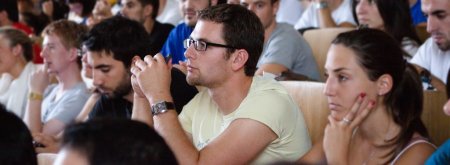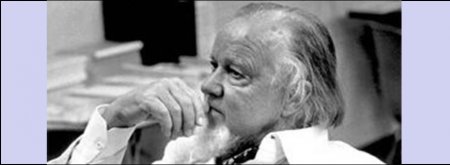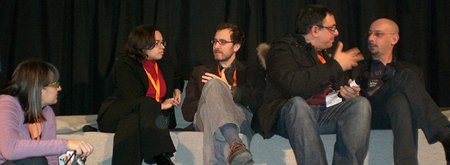
Why Are Christians Such Hypocrites?
We know that nobody is perfect, but don't Christians claim to be 'good people'?

We know that nobody is perfect, but don't Christians claim to be 'good people'?

An exploration of the ‘hidden’ first 25 years of the Christian era, examining the impact of Christ upon the ancient world.

A challenging call, based on the Acts of the Apostles, to think about how persuasive our evangelism is.

A talk on 'Science and Its Proper Boundaries: The Legacy of C.S. Lewis' outlining Lewis' views on science and scientism.

A brief account of some of the real history and real people to be found in the New Testament.

A helpful talk for understanding transgender issues and thinking about how to respond to a transgender person.

Four implications of 1 Peter 3:15 that will help you stand up and speak out about Jesus.

Why do people reject the idea of eternal life, and what are the consequences? What do Christians believe about it?

This talk puts the issue of sexuality and same-sex relationships into the wider context of Christian belief.

A response to Bertrand Russell's criticism that God does not provide enough evidence for people to believe in him.

Did 'core' Christian beliefs slowly change over history? This talk considers: the Gospels; the divinity of Jesus; and the resurrection.

What is agnosticism and is it a sensible approach to take to issues of truth and, in particular, to the claims of Christianity?

Are we good? Should we decide by comparing ourselves to other people or to God? Is goodness relative or absolute?

Does the philosophy of individualism lead to happiness? How does the desire for freedom link in with the human need for relationship?

Examining the concepts of self-worth and self-esteem and why such ideologies can leave us emptier than ever.

Why did Jesus have to die on the cross? This talk addresses 6 misconceptions about the cross and its significance.

Dr Keith Small describes his research into the 'textual history' of the Qur'an, and compares it with that of the New Testament.

General advice on how to approach your discipline of study from a Christian perspective to produce authentically Christian scholarship.

What does Christian scholarship look like when considered from the perspectives of Creation, Fall and Redemption?

Advice for Christians in academic life and the workplace.

A consideration of the relationship of science and certain Biblical issues, including the nature of miracles and the Exodus.

Advice on the role of, and issues facing, a Christian academic in the world.

A reflection on the life of Francis Schaeffer, particularly getting into his ideas on Truth and their relevance for today.

Andrew Fellows, Greg Jesson and Ranald Macaulay on the real Francis Schaeffer and his continuing influence and legacy today.

How should Christian academics conduct their lives and research within the life of the university?

The challenges, temptations and opportunities of academic life as a Christian.

Advice for those of us who want to engage with the culture in which we live, presenting the Gospel with integrity and relevance.

Alister McGrath provides advice for Christians considering the possibility of working in academia.

Responding to the question of whether the existence of Hell means that God cannot be a God of love.

Examining the problem of suffering first as an intellectual question and then as an emotional and visceral issue.

Considering the question of whether belief in God lacks the evidence to support it - and why arguments on their own are not enough.

Are God and science necessarily in competition? Does science fit better with Christian belief or with atheism?

Peter May considers some of the earliest evidence for the resurrection: the early Christian creed recorded in 1 Corinthians 15:3-5

Why are Christians so hypocritical, nasty & judgmental? A response to one of the most common objections to Christianity.

How Christian apologetics has used science in its response to the claims of the New Atheists. Boyle Lecture 2014.

This talk considers the difficult issue of Hell - what it is and how a loving God can send anyone there.

This talk explains why the claim that Jesus was no more than a moral teacher doesn't account for the evidence about him.

We all know there's lots of suffering in the world. If there is a God why doesn't he do anything about it? Doesn't he care? Or is he…

Adrian Holloway examines the question of how sure we can be that Jesus really rose from the dead.

Adrian Holloway tackles the question of whether we can trust what we read in the New Testament or should dismiss it as unsubstantiated myth.

Richard Dawkins, Rabbi Josh Levy and Chris Sinkinson join Justin Brierley to discuss the morality of the Old Testament.

For the first time, Western Orientalists (primarily in Europe) are applying an external historical / critical analysis of the Qur’an,…

This talk covers some of the basic concepts of truth, logic and persuasion which are helpful when we are 'defending and communicating the…

"You would think that wouldn't you?" By way of Freud's Father complex and Dawkins' memes, Melvin Tinker examines how C.S. Lewis might…

Richard Bauckham and James Crossley discuss Bauckham's book 'Jesus and the Eyewitnesses' and consider its implications, on Justin…

Bob Price and David Instone-Brewer discuss the Bible's attitude to slavery on Justin Brierley's 'Unbelievable?' radio programme.

Socrates said 'The unexamined life is not worth living'. Taking this as his starting point, Os Guinness investigates the big questions.

These two dialogues explore some of the key areas where Jehovah's Witnesses differ from mainstream Christianity, to help in sharing faith…

Bill Craig and A.C. Grayling debate the problem of suffering in the light of tsunamis, on Justin Brierley's 'Unbelievable?' radio programme.

Paul Davies & John Lennox discuss whether life might exist elsewhere in the universe and discuss signs of design in the universe.

A.C. Grayling discusses the arguments in his book The God Argument with Peter S. Williams on Justin Brierley's 'Unbelievable?' radio…

A talk considering the question: 'Does belief in God simply lead to war and conflict?'

This talk looks at who Jesus is and examines some of the misunderstandings about him, as well as his impact in history and the impact he…

Two talks from the Theology Network's 'Biggest Mistakes' Conference provide helpful advice for anyone studying theology or philosophy.…

In this talk, GP Dr Rhona Knight asks what it means to be 'old-fashioned' about sex and what it would mean to be 'up-to-date' God's way.…

This talk was given by Ann Brown at Canterbury University Christian Union. © 2012 Ann Brown This resource is provided by the kind…

Michael Ots considers the question of self-image and asks what is the value of any human being. The talk lasts about 30 mins and is…

Isn't following Jesus all about rules that stop you living the way you want?

How can we know whether there is more than one way to salvation?

There are many different views of Jesus. What's the truth?

The earthquake in Pakistan, the tsunami in Southeast Asia, the devastating hurricane in the gulf coast of United States, babies dying of…

Michael Ots asks three questions about suffering: 1. Why is there suffering? 2. What, if anything, has God done about it? 3. What will…

There are a number of popular misconceptions about Christianity that arise in today's society. Brian Douglas answers four of these as he…

Many people today describe that they are 'living inside their own head'. This describes a state of disconnection from reality outside of…

This talk, given by Stefan Lindholm from English L'Abri, considers the relationship between philosophy and theology – between…

Myths are stories which are important to societies. But can it be helpful to compare the Gospel to stories such as The Lord of the Rings,…

Edith Reitsema, from English L'Abri,considers the relationship between memory and faith. She asks two key questions: 1. What should we do…

Most people are comfortable with the idea that "spiritual = supernatural". The supernatural is invisible. Does this mean that when we…

Tom Price gives a talk and leads a discussion on happiness, linked to clips from the film Thirteen Conversations About One Thing. The talk…

Sincere, Bible-believing Christians often have sharply different views on the issue of creation and evolution. Some hold that evolution was…

This is the first of two talks given by Andrew Wilson at Grace Church, Chichester. He uses five stories from the Bible to illustrate his…

In this talk, Os Guinness considers how we can communicate creatively in our evangelism and apologetics. By considering the nature of…

Christians Richard Morgan and Todd Pitner discuss with atheist Gordon Livesey the value of religious experience for belief in God.…

The events of this past week leave us all numbed and confused as the appalling pictures from Haiti are beamed into our homes. This poor…

These talks look at what apologetics is and how we can be more effective in defending and communicating the Christian message.

Absolute truth is often thought to lead to oppression and injustice. But what if it is the only way to real freedom?

What does it mean to write from a Christian worldview?

Dr Timothy Keller considers the doctrine of the Word through reflections based around Psalm 19.

In a talk given at The Veritas Forum at the University of California, Santa Cruz, in February 2007, Professor Owen Gingerich, who has…

This workshop addresses the function of the will both in the formation of a belief and the critical review (audit) of one’s network…

In a talk given at The Veritas Forum at Texas A&M University, in February 2006, Dr Hugh Ross discusses whether there is scientific…

In a talk given at The Veritas Forum at the University of California, Santa Barbara in October 2000, Professor Craig Blomberg discusses new…

In a talk given at The Veritas Forum at the University of Florida in January 1995, Professor Paul Vitz provides a Christian critique of…

A lawyer's examination of the evidence for Christianity.

[This talk gives] the background for what we’re going to look at in the next few sessions, which will be on the resurrection of Jesus…

In a talk entitled 'The Language of God: A Scientist Presents Evidence for Belief' given at The Veritas Forum at the California Institute…

In a talk given at The Veritas Forum at Louisiana State University in March 2006, Jay Budziszewski considers "natural law" – the…

In a talk given at The Veritas Forum at the University of Virginia in March 2009, Dr Os Guiness considers the different ways that people…

In a talk given at The Veritas Forum at the Texas A&M University in February 2005, Professor Eleonore Stump considers how a 'second…

In a talk given at The Veritas Forum at the University of California, Santa Barbara in February 1998, Dr James Sire considers the role of…

In a talk given at The Veritas Forum at Louisiana State University in February 2008, Dallas Willard asks where moral teaching is to be…

Reflections on the resurrection of Jesus and what it says to us about our own resurrection life.

In this talk, Professor Plantinga provides an evolutionary argument against naturalism. An outline of the lecture is also given.

Can the Bible tell us anything about God or is it just meaningless language?

In a talk given at The Veritas Forum at the University of Cambridge in March 2008, Dr Elaine Storkey considers what it means to have a…

This talk is based on Colossians 1:15-23, and calls Christians to be involved with the real world in which God has placed us. Paul Wooley…

Bart Ehrman and Pete Williams debate the trustworthiness of the New Testament documents on Justin Brierley's 'Unbelievable?' radio…

The first talk in this series asks why Christians often find it so difficult to talk about their faith and suggests that there are two key…

Ranald Macaulay considers the place of the mind in the life of the Christian. The talk lasts for about 25 minutes, followed by a Question…

Gavin McGrath takes a look at some of the problems that Christians experience in their lives. © Gavin McGrath Used by the kind…

When there is so much evil and suffering all around us, how can we believe God is good?

With so many different religions and ways of viewing the world, how can Christians claim their way is the right one?

Three scientists present their own distinctive perspective on the proper understanding of Genesis chapters 1-3. Each speaker describes…

In this talk, Mardi Keyes considers the problem of evil under four main headings: 1. The problem of evil for Christian believers.2. The…

Andrew Fellows examines the problems that can arise when reason and imagination are separated in human life. He argues that only in Christ…

Gavin McGrath examines whether we can talk meaningfully about truth. Is the truth 'out there' or perhaps 'in here'?

Dr John Dickson considers the approach to the problem of pain adopted by a number of different worldviews. Although the Bible does not…

Series of 5 talks giving an introduction to Islam from a Christian perspective.

The late British missiologist Lesslie Newbigin made a profound impact on many evangelicals. His prophetical call to mission in the West was…

The resurrection of Jesus is the basis for Christian faith (1 Corinthians 15) and Christian hope (1 Peter 1–3). Therefore the…

Dr John Dickson describes the key sources for our knowledge of the life of Jesus, assessing them from the perspective of an historian.

Who did Jesus really think he was? Did he actually claim to be God? And does it matter if he did?

Jerram Barrs asks how Christians can connect with non-Christians. He urges all Christians to take people and their questions seriously.

Ranald Macaulay considers the nature of truth and the revelation to be found in the Bible.

Four individuals consider the issues raised by the ongoing debate concerning Intelligent Design (ID) and advocate their own perspectives on…

A series of sermons by Rev Melvin Tinker considering what we can learn about suffering from the book of Job.

In 1983, when Alvin Plantinga delivered his inaugural lecture as the John O’Brien Professor of Philosophy at the University of Notre…

Please note that the content of this talk partially overlaps that of Jerry Root’s other talk entitled 'C.S. Lewis’s Approach to…

Greg Grooms reflects on knowledge, certainty and how we know what we know. After a whistlestop tour through the philosophical reflections…

Why the growing popularity of Jane Austen? Is it accidental, a typical postmodern temporary fad, or is there some deeper reason for the…

What about other religions? When the world is moving in such a globalizing way, believing in one truth seems naive at best, and intolerant…

Jerram Barrs considers the place of the mind and the heart in the Christian faith, and argues that Christians have often failed to love God…

C.S. Lewis had a first rate mind and a poet’s power of expression. This talk looks at how he applied his powerful imagination to…

In this talk, Dick Keyes considers what agnostics believe, why they believe it and whether they are justified in believing it. He then asks…

Moral objections to Christianity are some of the deepest and hardest to answer. This talk offers guidance for navigating this tricky area.

Dallas Willard considers what we can learn from the example of Jesus as a master logician and an excellent apologist.

During the Question and Answer session of Professor Craig's Manchester Lecture "Is Life without God Absurd?", he was asked how he came to…

Is there such a thing as the 'self'? Who am I? An historical and Biblical perspective on understanding the self and human identity.

In this talk, Gary Habermas analyses the claims by James Cameron, in his Discovery Channel documentary 'The Lost Tomb of Jesus', that a…

Melvin Tinker considers what God might want to say to Richard Dawkins in the light of his recent book The God Delusion. For more…

In this talk, Hans Rookmaaker considers what art is, what its purpose is and what the attitude of Christians should be towards it.

Who is Jesus? Who did he claim to be? What questions might we need to ask? What kind of evidence is there?

The message / idea, that it is intolerant if you actually think that a particular view might be true and that all views should be equally…

Bart D. Ehrman is a world expert in the textual criticism of the New Testament who has recently written a best-selling book entitled…

Rudiger Sumann talks on the subject of 'I Know Christianity is True but I Can't Believe It'.

This lecture was given by Professor William Lane Craig at Cambridge University as a part of UCCF's Reasonable Faith Tour. The lecture is…

This lecture was given by Professor William Lane Craig at Manchester University as a part of UCCF's Reasonable Faith Tour. The lecture is…

This lecture was given by Professor William Lane Craig at Nottingham University as a part of UCCF's Reasonable Faith Tour. The lecture is…

A 40 minute talk presenting evidence for the truth of Christianity. Followed by 30 minutes Q&A.

What has led to the rise of modern paganism? This talk helpfully assesses the challenge paganism poses to Christianity, and vice versa.

Nick Perrin investigates how the New Testament books came to be accepted into the Biblical 'canon'. Through an examination of the views of…

What is the Christian’s mission in the world? What should be our driving motivation both as individual believers and as Christians together?

Rapid advances in medical understanding and possible treatments present many challenges to society in general and challenge the Christian…

Dr Little asks whether science and religion are completely different in how they find truth. Are there two ways of knowing - one by facts…

William Lane Craig considers one of the central concerns in the Philosophy of Religion - the coherence of theism.

What do Christians mean when they claim that Christianity is true?

In this 50 minute talk, William Lane Craig considers how the philosophical study of knowledge (epistemology) illuminates the validity of…

William Lane Craig examines the Big Bang theory and the question of why anything exists.

The fundamental question concerning miracles is what is the nature of God’s relationship to the world? Christians claim: God is…

John Lennox speaks about God and Richard Dawkins and undermines the concept that religion and science are in inevitable conflict with each…

Three talks by Wim Rietkerk entitled 'The Challenge of Atheism' consider whether Christianity whould be seen as an ideology or as a…

Most people in the world believe that when the world began, it was perfect. For the most part, humanity stands in agreement that something…

John Lennox speaks on the topic of Peter Singer and Utilitarianism.

Two talks on the 'Psychological Barriers to Belief' look at basic life patterns and past painful experiences.

Every day as you read the newspapers you are flooded and bombarded by a world that is imbued with suffering and pain. Why all this…

What has led to the current thinking on what we can know and how we come to know it? Bruce Little considers postmodernism and epistemology.

What is depression? Is depression sin or sickness? How can we recognize Clinical Depression? What makes some people more vulnerable to…

How are we to think about our lives? The most basic thing we can say about our human life is that God created us to be like Himself –…

One of the most common points on which Muslims attack Christians is on the whole question of the nature of God: in short, is God…

What is the basic biblical teaching on forgiveness? Is there a difference between an apology and asking forgiveness? What about hard cases…

In this seminar, Bruce Little considers the broad range of Christianity and the Arts. “Why, if you are interested in the country…

Modernism and Postmodernism both have great influence. Which elements can be accepted, and which must be rejected,

This three part seminar gives an historical overview of the various schools of thought on the subject epistemology - how we can know…

A series of four talks addressing Modernism and Postmodernism.

There have been times when Christians found it easy to believe in the justice of God, but found it difficult to believe in the love of God.…

From the laws of physics themselves and their physical constants to the astrophysical picture of the development of the universe to the…

A talk on the relationship between intellectual proof and faith. How does faith fit in with thinking?

Should we endeavour to prove Christian faith? Is it wrong to try to? Should we just simply present the gospel and ask for a response?…

Edith Reitsema discusses the life and philosophy of the late 19th century German philosopher Friedrich Nietzsche, who challenged Christian…

Andrew Fellows' series of four talks on Narcissism - the Worldview of Self

In this talk, Andrew Fellows connects the use of films to the stage of subversion in the apologetics process. This can then be followed by…

This seminar on outreach to Muslims was given in the context of University evangelism, but its principles and advice are useful for a…

Dick Keyes' series of three talks on Apologetics considers the prevalence of idolatry today and how we can challenge people to realise and…

Dick Keyes reflects on the three ideas of Pluralism, Relativism and Tolerance and the relationship between them. He argues that there is…

Francis Schaeffer considers how Christians might provide possible answers to some of the basic philosophical questions that challenge…

It is difficult to exaggerate the importance and impact of C.S. Lewis. Although he died in 1963, most of his books are still in print and…

Francis Schaeffer shares his understanding of what apologetics is and how it can bring together historic Christianity and contemporary…

Sometimes Christian pastors, parents and teachers are afraid of the questions young people and others might ask. Questions of another…

William Shakespeare is regarded as the greatest writer in the English language - yet we know little about his personal life. Jerram Barrs…

The Jesus Seminar claims that some of the words of Jesus recorded in the Gospels were actually said by him but others were invented by the…

In this workshop, we will discuss the specific problems with the novel The Da Vinci Code from the standpoint of its handling of Christian…

How does the historical Jesus compare with the Jesus we find in the Qur'an and with the historical Muhammad?

Pilate entered the praetorium again and called Jesus, and said to him, “Are you the King of the Jews?” Jesus answered,…

The Harry Potter publishing phenomenon has divided many Christians, unsure how they should respond. Jerram Barrs considers some of the…

In one poll, J.R.R. Tolkien's book The Lord of the Rings was voted the British public's best loved book. Jerram Barrs delves into Tolkien's…

Environmental and 'Green' issues are a prime concern for many people today. David Cook considers whether Christianity is to blame and asks…

Alister McGrath explains how the atheism of Richard Dawkins is grounded in his understanding of the natural sciences.

After an appraisal of recent scholarship on the historicity of the resurrection of Jesus Christ, Professor William Craig contends that,…

David Cook addresses the challenges that changes in cuture and thinking present to us as we do apologetics. Section I 1. THE NEED FOR…

This workshop will consider the relationship between faith and reason, what might count as evidence for religious claims, and the…

The landscape within which we do apologetics has changed. Our arguments can be sound, our evidence convincing (at least to us), but…

Religious pluralism has gained a foothold both as a mainstream academic position and in popular culture. John Hick must be understood as a…

David Cook considers the ethics of apologetics. He looks at why people reject the use of apologetics and whether they have a good case or…

Dr Greg Pritchard explains why he sees apologetics as the Science and Art of Christian Persuasion.

Oscar Wilde once said, "There are two tragedies in life. One is not getting what you want. The other is getting it!" The writer Barry…

What are the biblical foundations for apologetics and what models does it offer? Takes Acts 17 as a case study.

People have great respect for science as they form their worldview. They adopt false beliefs and learn to ignore competing information…

The fact that almost all aspects of human activity today are dominated by naturalistic assumptions means that for many the Christian…